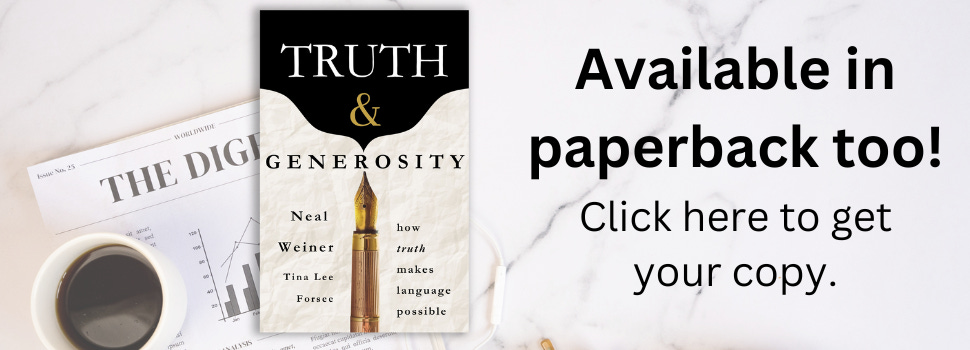News and Updates:
This is a short chapter, so the next one is coming soon.
Download Neal’s Ph.D. thesis on the divided line of Plato’s Republic (PDF) below. I would love to offer you an ebook, but I was working from a typewriter typed document and OCR technology just can’t handle it, apparently.
You can customize which bits of the newsletter you receive by visiting your account at any time. My regular posts will continue to be free.
PART II: Generosity and Shared Belief
Not included in audio
WE HAVE SEEN how the principle of generosity operates in everyday language, and we now stand at the threshold of understanding its greater philosophical implications. In this section I hope to demonstrate how the principle of generosity underlies all communication whatsoever and thereby guarantees the unified, public character of anything worth calling a world.
To do this, I will begin by describing a shift in attitude that occurred in the Western philosophical tradition. I realize it might seem strange to bring up ancient history at this particular moment, but I think it is important to shed light on our own attitudes toward trust, skepticism, and knowledge. Next we will turn to what are known in philosophy as thought experiments, or investigations into the nature of things carried out by the imagination. We will begin by imagining the origin of language and the very first sentence ever spoken, and we will follow this up with Donald Davidson’s famous thought experiment, radical interpretation, which will have us consider what would be required to translate an utterly unknown culture’s language into our own. But first, I have a few things to say about relativism.
7
Politics and Relativism
CONCEPTUAL RELATIVISM, the belief that truth is whatever a particular individual or culture happens to believe, or its linguistic correlate, that language determines thought, is an incoherent doctrine that cannot support its own possibility. Very little in philosophy has been so handily refuted: extreme relativists believe absolutely that absolutism is false.
But to know this is really not enough. We need to understand the cultural hunger to which relativism speaks.
It is important to note we don’t need epistemic equality in order to have political equality and a large measure of tolerance for opposing views. Indeed, that is how the founders of our liberal democracy conceived the matter. It never crossed their minds that all people might be equally right, which is quite different from equal rights. What mattered was only that we learned to tolerate divergent opinions, however wrong or stupid we thought they were.
It took a long time, roughly from 1776 to 1976, for political equality (equality of political rights) to turn into first social equality (equality of income or opportunity) and then epistemic equality (relativism), but it happened. Postmodern pluralism grew out of social and political pressures, particularly in the sixties as people sought more than mere tolerance of previously marginalized ways of thinking for a wide variety of groups. Equality was epistemically extended and taken as an ultimate value. It was a question of demanding respect for what had been held low. Since the various cultural views associated with these groups were tied to specific ways of knowing—the non-verbal, intuitive, emotional, poetic, and so forth—these all had to be equalized. Rival epistemologies led to contradictory conclusions, so it became necessary to speak as if these contradictory ‘truths’ corresponded to alternative realities.
There was and still is real oppression, both political and epistemological, but the blind worship of equality comes at the cost of the distinction between knowledge and opinion. No one on the list of epistemically-privileged groups can fail to get it right, but only, of course, for them. This tinny truth is a lukewarm comfort that pales in comparison to the truth about which one can be wrong. Bluntly put, the product was cheapened to make it readily available.
Relativism speaks to the demand for an egalitarian society. The question is how to retain its democratic virtues without its nihilistic vice. In the next chapter we will evaluate an ancient alternative to relativism to see what it has to offer.
What do you think?
Questions? Comments? Ideas?
Contents
Some of these links won’t work if the chapter hasn’t been published yet.
Download the full audiobook with a Spotify promo code.
Chapter 1: The Principle of Generosity
Chapter 2: Violations of the Principle of Generosity
Chapter 3: The Poetry of Ordinary Language
Chapter 4: What Language is Not
Chapter 5: Etymology and Truth
Chapter 6: Social Influences on Semantic Change
Chapter 7: Politics and Relativism
Chapter 9: The Origin of Language
Chapter 10: Radical Interpretation
Chapter 11: How We Recognize Language as Language
Chapter 13: The Heart of Truth
Chapter 14: Generosity Beyond the Sentence
Chapter 15: The Interpretive Ideal
Chapter 16: Interpreting the World through Generosity










Truth and Generosity: Chapter 7